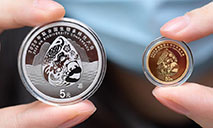Innovation fuels China's seed industry

Photo taken on Oct. 10, 2021 shows a wall showcasing seed diversity during an exhibition held by the Chinese Academy of Sciences (CAS) in Kunming, southwest China's Yunnan Province. (Xinhua/Jin Liwang)
TIANJIN, Oct. 19 (Xinhua) -- Innovative agricultural products, ranging from 40-kg watermelons to screw-like chilies, have caught the eyes of visitors to the ongoing Tianjin International Seed Expo 2021, which opened Saturday in north China's Tianjin Municipality.
Ji Xingwang, 52, bought some pumpkin and cucumber seeds at the three-day event for his parents. "We plan to plant the seeds in our home's small yard. It is so delightful to see various kinds of seeds here. That's beyond my imagination," Ji said.
China has made the development of the seed industry a major task of the country's agricultural and rural modernization. Many companies in the seed industry seek ways to develop new kinds of seeds to meet customers' increasing demands.
"We brought more than 30 varieties of chilies to the fair. As living standards have greatly improved, Chinese people now have a bigger appetite for high-quality chilies, said Dai Yunzhi, chairman of Hebei Linglan Agricultural Technology Co. Ltd. His company invests 20 percent of its annual sales revenue in seed research and development.
According to Dai, over one thousand hybrid varieties must be created each year before dozens are selected and possibly released to the market to meet different environmental and climate conditions.
"The screw-like chilies look good and taste better to make them more popular. Also, they can bring more earnings to farmers," Dai said. "One hectare of plantation can produce about 52.5 tonnes of screw-like chilies, bringing in a revenue of about 450,000 yuan (about 70,000 U.S. dollars) this year."
"After over ten years of innovation, our watermelon varieties and breeding technologies have become more and more mature. Currently, our products cover the entire Chinese market," said Zeng Xiangdong, general manager of a watermelon seed producer in the northeastern Chinese city of Harbin.
"Through a large-scale, streamlined, and modular seed breeding process, our seed products are welcomed by the market. Our annual sales revenue can reach about 220 million yuan," said Ma Dehua, president of Derit Seeds.
Derit Seeds, a leading vegetable seed company established in 2003 in Tianjin, invests more than 20 million yuan in its cucumber and melon seed cultivation every year.
China once relied on importing broccoli seeds from other countries, said Sun Deling, a researcher at the Tianjin Academy of Agricultural Sciences. Sun has engaged in broccoli seed breeding for decades.
After years of scientific research and industrialization promotion, the market share of domestic broccoli seeds in China is about 15 percent and will likely reach 20 to 25 percent in five years, Sun said.
Sun added China has made great progress in vegetable seed industry in recent years, it is even leading the world in genome research of vegetables.
According to data from the Ministry of Agriculture and Rural Affairs, the coverage rate of improved crop varieties has exceeded 96 percent. The country's independently developed varieties occupy more than 95 percent of the total crop planting area.
China's seed market is growing. As the world's second-largest seed market, China had more than 6,900 licensed seed companies, with a seed market size of about 120 billion yuan in 2020, said Zhang Yanqiu, president of the China National Seed Association.
China will strengthen the protection and utilization of germplasm resources, promote seed industry innovation, support high-quality seed enterprises, and enhance intellectual property rights protection, said Liu Huanxin, vice minister of agriculture and rural affairs. Liu made the remarks at the China Tianjin Seed Industry Revitalization Conference, held together with the seed expo.
"We are pleased to see the government's increasing efforts on intellectual property rights protection in the seed industry, which is to see a golden period of self-innovation," said Ma, president of Derit Seeds.
Photos
Related Stories
- Interview: Kunming Declaration ushers in new era for biodiversity conservation, says FAO official
- Ecological Civilization Forum of COP15 closes in Kunming
- Views of Baofeng Peninsula Wetland in Kunming,Yunnan
- Interview: Kunming Declaration lays down foundation for biodiversity protection targets: Australian ecologist
- Chinese vice premier stresses seed industry vitalization
Copyright © 2021 People's Daily Online. All Rights Reserved.










